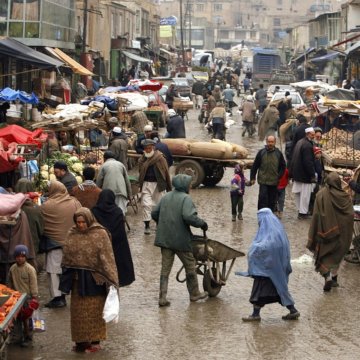- About
- Topics
- Story
- In-Depth
- Picks
- Opinion
- News
- Donate
- Signup for our newsletterOur Editors' Best Picks.Send
Read, Debate: Engage.
| topic: | Peace and Reconciliation |
|---|---|
| located: | Afghanistan, Germany |
| editor: | Shadi Khan Saif |
For any peace parley, the will of the warring factions for an end to bloodshed is simply judged through their desire and indeed practical steps towards the initial truce. This is something worryingly missing from the discourse in war-ravaged Afghanistan, where at least the two main warring parties – the U.S. and the Afghan government and the Taliban insurgents – are determined to muscle through their way for greater space and authority ahead of the key intra-Afghan talks.
With full regard to progress made so far towards the peace parley, the core issue of trying to use crude force to influence the talks, or at least the start of it, means a doomed future anyways.
It has been emphasized time and time again that no one is going to hurt more from the continuation of the raging violence than the Afghans, and no one but the Afghans is going to benefit more from an immediate truce. Therefore an immediate national truce is of paramount importance, which should not be allowed to be used as a bargaining chip by any party.
The Germans, among a handful of other nations, have the first-hand experience of it, but they have later proven the value of peace to the world with their modern history. Germany's role as the current president at the UN has been instrumental to ensure, after some 100 days when Secretary-General Antonio Guterres’ called for a global cease-fire to support the COVID-19 response, the differences are overcome among global powers to unanimously adopt a resolution supporting the truce.
“The fury of the virus illustrates the folly of war,” Guterres said in calling for the global cease-fire. “It is time to put armed conflict on lockdown and focus together on the true fight of our lives," said the Secretary-General.
The German foreign minister, Heiko Mass, has also taken a practical approach to take the issue head-on by saying that: "Let us now implement it (truce) together by working towards country-specific ceasefires."
Official estimates by the Afghan government suggest at least 24 civilians are getting killed or wounded on a daily basis in Taliban attacks across the country. Last week was dubbed by the government as the deadliest in the 19 years of insurgency when the Taliban carried out 422 terrorist attacks in 32 provinces killing and wounding 831 security and defence forces.
Now, add to this, a single-day killing of at least 26 civilians and many more in artillery attacks by the government forces in Helmand province last week.
Already behind schedule on the proposed intra-Afghan talks, the warring parties here would never be sparred by history if they kept criminally delaying truce in a stubborn manner and continued with the senseless ugly war.
Image by David Mark

